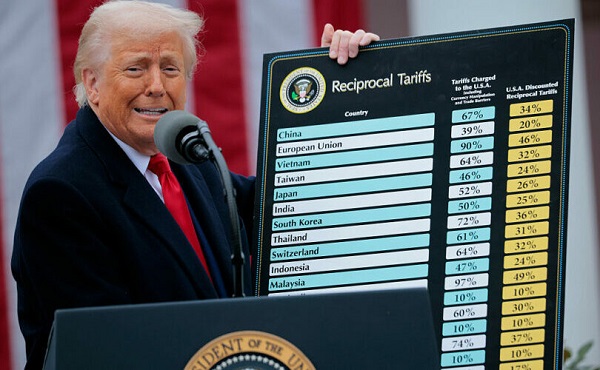Canadian Energy Centre
Unleashing Canada’s competitive advantage in energy and natural resources

From the Canadian Energy Centre
By Cody Ciona
Q&A with Bryan Detchou, senior director of natural resources, environment and sustainability with the Canadian Chamber of Commerce
Canada’s energy sector is one of the country’s greatest strengths, says an emerging leader with the Canadian Chamber of Commerce.
Bryan Detchou is the Chamber’s senior director of natural resources, environment and sustainability.
A former government relations consultant and staffer on Parliament Hill, in 2023 The Peak recognized Detchou as one of Canada’s young leaders shaping the country’s economy, culture and society.
The Chamber boasts a membership of over 200,000 businesses, including many energy-related companies. Detchou helps advocate for achieving the sector’s untapped potential.
Here’s what he shared with the Canadian Energy Centre:
CEC: Why does the Canadian Chamber of Commerce support Canada’s oil and natural gas sector?
BD: The mandate of the Canadian Chamber of Commerce is to support and be the leading voice for all businesses across the Canadian economy.
You cannot discuss the Canadian economy without recognizing the essential role of the oil and gas sector.
CEC: What role should Canada’s energy sector play in the 21st century Canadian and world economies?
BD: We believe that Canada’s energy and natural resources sectors are sources of pride and deserve strong support. These sectors hold the potential for Canada to exceed expectations on the global stage, positioning us as a key player in solving many of the world’s pressing challenges.
The conflict in Ukraine has exposed vulnerabilities in European and global energy security, underscoring the critical role Canada can play in addressing these issues. It is not only Canada’s responsibility to its citizens but also its duty to the global community to be a strong and reliable energy partner.
However, our failure to act decisively on energy security weakens our position and undermines our ability to contribute meaningfully to the reduction of global emissions.
CEC: How can Canadian energy businesses take a leadership position in emissions reduction?
BD: The majority of emissions reductions are being driven by the private sector, and we’re already seeing significant investments from various organizations. However, the challenge lies in the substantial capital required for these initiatives.
Before making major investment decisions, companies need a level of certainty and predictability in the markets they operate in—this is where the government can play a stronger role.
Regulatory hurdles, such as amendments to the Impact Assessment Act and the slow deployment of Investment Tax Credits, continue to create uncertainty.
We must understand that this is a global race. Canada is not the only country working to reduce greenhouse gas emissions and attract the necessary investment.
It is our responsibility to identify and leverage our competitive advantages. There is still much Canada can do to ensure its regulatory framework is conducive to attracting investment and driving environmental progress.
CEC: How is the federal greenwashing Bill C-59 impacting Canadian energy companies?
BD: From the outset, we have been fully engaged in addressing the challenges posed by this new legislation, starting with our involvement when the amendment was first introduced in the House of Commons committee in late May.
We testified before the Senate in early June, voicing the concerns of the industry, and have remained actively engaged ever since.
We unequivocally support the goal of ensuring that no Canadian company engages in deceptive marketing, whether in terms of product claims or the communication of their environmental commitments, particularly those aimed at combating climate change. Transparency and accountability are fundamental.
However, the law’s vague language and the absence of a clearly defined methodology have unfortunately created uncertainty across all sectors of the Canadian economy. This uncertainty hinders the ability of businesses to openly and confidently contribute to Canada’s ambitious climate goals.
Rather than driving environmental progress, the new law has inadvertently undermined the significant efforts already made by Canadian corporations, and by extension, the Canadian government. It has become a barrier to both innovation and meaningful environmental action.
The time has come for the government to revisit this legislation. The government should do now what it should have done in May and work collaboratively with industry stakeholders to develop a made-in-Canada regime that ensures corporate accountability and transparency while fostering, not stifling, innovation and environmental ambition.
Only by doing this can we achieve the climate objectives that Canada is striving for.
CEC: What does the Chamber believe are the best steps forward for Canada’s energy sector?
BD: The best way forward for Canada’s energy sector involves recognizing and leveraging our natural resources as one of the country’s greatest strengths, rather than a weakness. In the face of global challenges Canada’s energy sector must evolve to address these pressing issues.
We advocate for a balanced approach that includes diversifying the energy portfolio with investments in renewable technologies and innovations like carbon capture and storage and hydrogen, ensuring a clear and efficient regulatory framework to attract investment, and strengthening Indigenous partnerships to foster shared prosperity.
Promoting sustainable resource development to meet net-zero targets, expanding global market opportunities, and enhancing collaboration between government and industry are crucial.
By embracing our energy sector as a key asset, Canada can enhance its role on the global stage, support our allies, and combat climate change effectively. Unleashing the full potential of Canada’s natural resources is essential for securing energy security, achieving economic growth and driving long-term prosperity.
Canadian Energy Centre
Saskatchewan Indigenous leaders urging need for access to natural gas

Piapot First Nation near Regina, Saskatchewan. Photo courtesy Piapot First Nation/Facebook
From the Canadian Energy Centre
By Cody Ciona and Deborah Jaremko
“Come to my nation and see how my people are living, and the struggles that they have day to day out here because of the high cost of energy, of electric heat and propane.”
Indigenous communities across Canada need access to natural gas to reduce energy poverty, says a new report by Energy for a Secure Future (ESF).
It’s a serious issue that needs to be addressed, say Indigenous community and business leaders in Saskatchewan.
“We’re here today to implore upon the federal government that we need the installation of natural gas and access to natural gas so that we can have safe and reliable service,” said Guy Lonechild, CEO of the Regina-based First Nations Power Authority, on a March 11 ESF webinar.
Last year, 20 Saskatchewan communities moved a resolution at the Assembly of First Nations’ annual general assembly calling on the federal government to “immediately enhance” First Nations financial supports for “more desirable energy security measures such as natural gas for home heating.”
“We’ve been calling it heat poverty because that’s what it really is…our families are finding that they have to either choose between buying groceries or heating their home,” Chief Christine Longjohn of Sturgeon Lake First Nation said in the ESF report.
“We should be able to live comfortably within our homes. We want to be just like every other homeowner that has that choice to be able to use natural gas.”
At least 333 First Nations communities across Canada are not connected to natural gas utilities, according to the Canada Energy Regulator (CER).
ESF says that while there are many federal programs that help cover the upfront costs of accessing electricity, primarily from renewable sources, there are no comparable ones to support natural gas access.
“Most Canadian and Indigenous communities support actions to address climate change. However, the policy priority of reducing fossil fuel use has had unintended consequences,” the ESF report said.
“Recent funding support has been directed not at improving reliability or affordability of the energy, but rather at sustainability.”
Natural gas costs less than half — or even a quarter — of electricity prices in Alberta, British Columbia, Ontario, Manitoba and Saskatchewan, according to CER data.
“Natural gas is something NRCan [Natural Resources Canada] will not fund. It’s not considered a renewable for them,” said Chief Mark Fox of the Piapot First Nation, located about 50 kilometres northeast of Regina.
“Come to my nation and see how my people are living, and the struggles that they have day to day out here because of the high cost of energy, of electric heat and propane.”
According to ESF, some Indigenous communities compare the challenge of natural gas access to the multiyear effort to raise awareness and, ultimately funding, to address poor water quality and access on reserve.
“Natural gas is the new water,” Lonechild said.
Alberta
The beauty of economic corridors: Inside Alberta’s work to link products with new markets

From the Canadian Energy Centre
Q&A with Devin Dreeshen, Minister of Transport and Economic Corridors
CEC: How have recent developments impacted Alberta’s ability to expand trade routes and access new markets for energy and natural resources?
Dreeshen: With the U.S. trade dispute going on right now, it’s great to see that other provinces and the federal government are taking an interest in our east, west and northern trade routes, something that we in Alberta have been advocating for a long time.
We signed agreements with Saskatchewan and Manitoba to have an economic corridor to stretch across the prairies, as well as a recent agreement with the Northwest Territories to go north. With the leadership of Premier Danielle Smith, she’s been working on a BC, prairie and three northern territories economic corridor agreement with pretty much the entire western and northern block of Canada.
There has been a tremendous amount of work trying to get Alberta products to market and to make sure we can build big projects in Canada again.
CEC: Which infrastructure projects, whether pipeline, rail or port expansions, do you see as the most viable for improving Alberta’s global market access?
Dreeshen: We look at everything. Obviously, pipelines are the safest way to transport oil and gas, but also rail is part of the mix of getting over four million barrels per day to markets around the world.
The beauty of economic corridors is that it’s a swath of land that can have any type of utility in it, whether it be a roadway, railway, pipeline or a utility line. When you have all the environmental permits that are approved in a timely manner, and you have that designated swath of land, it politically de-risks any type of project.
CEC: A key focus of your ministry has been expanding trade corridors, including an agreement with Saskatchewan and Manitoba to explore access to Hudson’s Bay. Is there any interest from industry in developing this corridor further?
Dreeshen: There’s been lots of talk [about] Hudson Bay, a trade corridor with rail and port access. We’ve seen some improvements to go to Churchill, but also an interest in the Nelson River.
We’re starting to see more confidence in the private sector and industry wanting to build these projects. It’s great that governments can get together and work on a common goal to build things here in Canada.
CEC: What is your vision for Alberta’s future as a leader in global trade, and how do economic corridors fit into that strategy?
Dreeshen: Premier Smith has talked about C-69 being repealed by the federal government [and] the reversal of the West Coast tanker ban, which targets Alberta energy going west out of the Pacific.
There’s a lot of work that needs to be done on the federal side. Alberta has been doing a lot of the heavy lifting when it comes to economic corridors.
We’ve asked the federal government if they could develop an economic corridor agency. We want to make sure that the federal government can come to the table, work with provinces [and] work with First Nations across this country to make sure that we can see these projects being built again here in Canada.
-

 2025 Federal Election2 days ago
2025 Federal Election2 days agoWATCH: Massive Crowd for Historic Edmonton Poilievre Rally
-

 2025 Federal Election15 hours ago
2025 Federal Election15 hours agoConservative Party urges investigation into Carney plan to spend $1 billion on heat pumps
-

 2025 Federal Election2 days ago
2025 Federal Election2 days agoAn In-Depth Campaign Trail “Interview” With Pierre Poilievre
-

 2025 Federal Election2 days ago
2025 Federal Election2 days agoHarper Endorses Poilievre at Historic Edmonton Rally: “This Crisis Was Made in Canada”
-

 2025 Federal Election2 days ago
2025 Federal Election2 days agoElection Security Briefing Confirms CCP-Linked Operation Boosted Carney
-

 Business2 days ago
Business2 days agoTrump’s tariff plan replaces free trade with balanced trade. Globalists hate that.
-

 2025 Federal Election15 hours ago
2025 Federal Election15 hours agoFifty Shades of Mark Carney
-

 2025 Federal Election15 hours ago
2025 Federal Election15 hours agoCorporate Media Isn’t Reporting on Foreign Interference—It’s Covering for It






